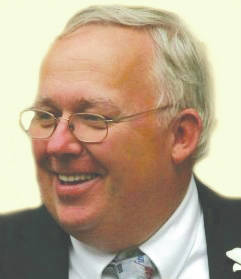The period of 1700-1900 is considered the Philadelphia church age (Revelation 3:7-13). The description of the Philadelphia church is a church with an open door that no man can shut.
History shows us it was a time when missionaries spread across the globe; evangelist held revivals that had people on their knees, confessing sin, receiving God’s forgiveness, salvation, and the Holy Spirit changing people’s lives. Church historians call this time “The Great Awakening.”
However, since the turn of the twentieth century, we have faded into the Laodicean church age (Revelation 3:14-22). The Laodicean church has two main characteristics — apathy and material wealth — without any spiritual value.
Revelation 3:15-17, “I know thy works, that thou art neither cold nor hot: I would thou wert cold or hot. So then because thou art lukewarm, and neither cold nor hot, I will spue thee out of my mouth. Because thou sayest, I am rich, and increased with goods, and have need of nothing; and knowest not that thou art wretched, and miserable, and poor, and blind, and naked:”
It is the Laodicean church where we see Jesus knocking on the door trying to get in — Revelation 3:20, “Behold, I stand at the door, and knock: if any man hear my voice, and open the door, I will come in to him, and will sup with him, and he with me.”
How did we go from an open door, spreading the gospel around the globe, to a closed-door with God pounding to get in?
Since God had nothing bad to say about the Philadelphia church and nothing good to say about the Laodicean church, I decided to read the books and sermons from the Philadelphia period.
Charles Finney, D.L. Moody, and Charles Spurgeon, Jonathan Edwards, George Whitefield, John Wesley, and others were great preachers and writers of the time. These men may have had differences when it came to doctrine, but one thing they all had in common, that is uncommon today — they all preached a lot about sin. Edwards preached the sermon, “Sinners in the Hands of an Angry God,” which became a classic of early American literature.
Sin, God’s judgment, God’s holiness, God’s Sacrifice, God’s forgiveness are all parts of the gospel. The problem is sin, and God’s judgment remains unmentioned in a Laodicean church message.
Paul explains the power of God that leads to salvation is revealed in the righteousness and wrath of God. Romans 1:16-18, “For I am not ashamed of the gospel of Christ: for it is the power of God unto salvation to every one that believeth; to the Jew first, and also to the Greek. For therein is the righteousness of God revealed from faith to faith: as it is written, The just shall live by faith. For the wrath of God is revealed from heaven against all ungodliness and unrighteousness of men, who hold the truth in unrighteousness;”
Without sin, there is no wrath, without wrath, there is no judgment, without judgment, there is no need for salvation, without a need for salvation, there is no need for the cross.
Many churches and individual Christians do not see sin (if they recognize sin at all) as a problem needing solving. But it is the reason Christ came (1 Timothy 1:15; Matthew 1:21). A sermon may mention that Christ died on the cross, but if we have not done anything wrong, what is the point?
Christ’s main reason for coming was not to be a psychologist to help us through depression, anger, and other issues. He came to save us from our sins. Matthew 1:21, “And she shall bring forth a son, and thou shalt call his name JESUS: for he shall save his people from their sins.” I am not saying He does not solve the other issues, but the sin problem is first and foremost.
The solution to the sin problem is through His blood. 1 John 1:7, “But if we walk in the light, as he is in the light, we have fellowship one with another, and the blood of Jesus Christ his Son cleanseth us from all sin.”
Immediately after telling us His blood takes care of the sin problem, God addresses the importance of the sin problem. 1 John 1:8, “If we say that we have no sin, we deceive ourselves, and the truth is not in us.”
Then the very next verse tells us that confessing of sin leads to forgiveness. 1 John 1:9, “If we confess our sins, he is faithful and just to forgive us our sins, and to cleanse us from all unrighteousness.”
When was the last time you heard a minister preach about sin or a sermon that emphasized the blood of Christ?
The Great Awakening occurred during the Philadelphia church age because the church addressed the core issue first — sin. Once sin is solved, through the blood of Christ, everything else is only a matter of time.






